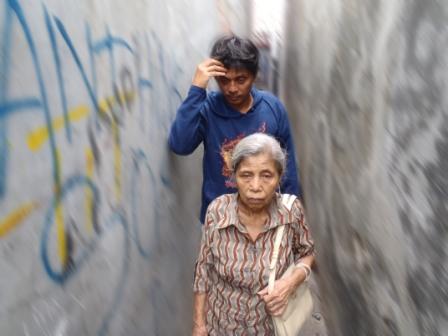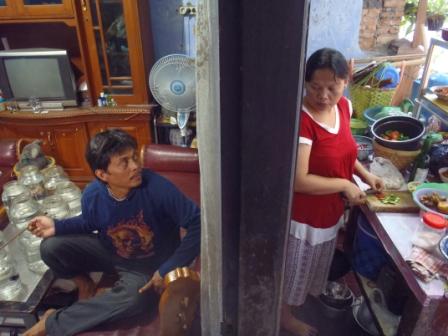Dutch director Leonard Retel Helmrich has spent a decade following the everyday lives of Indonesia’s Sjamsuddin family, a working-class clan with their roots in the countryside whose working lives have taken them into the hubbub of the country’s capital Jakarta. Position Among the Stars is the final work of a trilogy, its immediate subject the importance of granddaughter Tari going to college to receive the further education that will give her new opportunities. But, as much as anything else, Retel Helmrich (himself of part-Indonesian descent) captures the sheer variety and vitality of the lives he observes, their choices between tradition and modernity, and the social changes that living in so rapidly developing a country brings.
The director’s first film The Eye of the Day, from 2001, introduced us to the Sjamsuddins against a background of national unrest that followed the resignation of Indonesia’s second president Suharto in 1998 (after a respectable 32 years in power). Its dominant figures were the family matriarch Rumidjah and one of her sons, Bakti (pictured below right). Shape of the Moon followed three years later, with attention moving towards Bakti’s niece Tari, as wider society began to register the rise of Islam.

The beginning, in which Bakti returns to the family village to bring Rumidjah to Jakarta so she can persuade Tari to go ahead with further education, is a case in point – take away the brilliantly shot colour and a smattering of contemporary details and we could be back in different cinematic rural worlds like that of Satyajit Ray’s Pather Panchali from half a century earlier. It’s an economically poor existence based on agriculture, where traditions continue around the family cemetery – a far world indeed from the bustle of Jakarta, in which the working-class family exists in a steady enough economic position, definitely not that of poverty, but also visibly apart from the riches of the city. Tari is increasingly absorbed in attributes of teenage life to be found everywhere – mobile phones, tinted contact lenses, motorbikes, even ice-skating.

But it’s more general differences of opinion that we come to appreciate in a sense that is less heavily stressed: Rumidjah’s attempt to introduce a grandson to her Christianity, against Bakti’s insistence that the family’s faith is Islam; Bakti’s furious reaction to reports that Tari has been holding hands with a boy in the market; and the different generations’ approach to thrift and spending. Rumidjah’s quietly bemused wisdom keeps such conflicts at bay (just as, it’s worth noting, most of the very able administrators in this rather chaotic society are women). For all his insistance that Tari needs to get ahead, Bakti balks when he realises annual college fees are $2,300, and tries to persuade her against it; it’s Rumidjah’s almost wordless trip to the bank with her granddaughter to mortgage her small-holding back in the village that finally decides the matter. Her explanation: “We all failed, but one of us has to become a winner.”
This trilogy is well up there in the firmament of contemporary documentary
Position Among the Stars is somewhat cumbersomely titled, and following the song that Rumidjah, returned to her village in the final scene, complete with a canister of gas and a new single-ring burner, sings to the night sky (the film opens with the same image), “place in the stars” would seem better. Hers is a world in which stars are a reflection of the eternal, the opposite of its Jakarta definition, one of “winners” and those with access to the culture, and implicitly accompanying wealth, of a very different kind of stardom.
Retel Helmrich together with Ismail Fahmi Lubish as co-cinematographers capture all this with colour and energy (outstanding steadicam work keeps us within scenes, even when they are dominated by rapid movement). He certainly “builds” shots with an intention that goes rather beyond a simple cinema vérité approach, though he insists that he doesn’t stage scenes. The director’s interaction with the family certainly looks complete, even if we may wonder just how much, by this third film, his subjects have learnt some of the rules of the documentary game (one early scene has the newly arrived Rumidjah distressed to hear from Tari that she’s failed her high school exams, only to learn that she’s having a joke played on her). But as a testament to how this society has changed over a decade, Retel Helmrich’s trilogy is well up there in the firmament of contemporary documentary.
- Position Among the Stars plays at the ICA in London from 17 February to 1 March, then around the UK
Watch the trailer to Position Among the Stars














Add comment